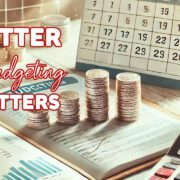
WHILE we are still in a ‘cost of living crisis’ and inflation is needlessly high, it is worthwhile to spring clean your spending every now and then, even if it is summer.
There are some helpful hints and attitudes. Often, financial advice focuses just on money, but this isn’t always the best approach. What’s the sense of cranking up the heat in a house with damaged windows? So, we should address the psychological issues first, then address the financial issues.
The consumerism machine is determined to keep your financial account empty, and its pull is as strong as a black hole.
Most behaviours in life are motivated, and saving/being thrifty is no exception. When I say 20% efficiency in your spending or saving, it feels like we’re sucking a sweet with the wrapper still on, since it may easily be perceived as a meaningless plastic number, but 20% of a week is one day. Working five days and being paid for four is the equivalent of being 20% inefficient.
Another motivator is to think of money as time. Money can be replaced, but not time. As a result, a £100 purchase could be viewed as eight hours of work at £12.50 per hour. Eight hours is a significant amount of time that could be spent elsewhere.
In both of the preceding examples, this time should be weighed against what you enjoy doing the most. Spending time with family, on a boat, in nature, on a golf course, or alone appears more appealing than wasting time. As a result, ‘time’ is the true currency. You only have a limited time in this lovely world, so make the most of it.
As a result, it is critical to any financial strategy that you decide what you want, not marketing or consumerism.
What are your fundamental principles and beliefs?
Consider a time in the last few years when you were very irritated or sad. Which of your ideals or beliefs were challenged at the time?
Then recall a period when you were at your peak and the alarm clock couldn’t come fast enough. Which of your aims, principles, or beliefs were nurtured at the time? What were you up to? Many of your answers can be found in that life design work. Go find them.
This will also provide you with the autonomy mentioned in one of the human givens below.
Resolve to disconnect from all distractions and media that have you comparing yourself to everyone. When you compare yourself to other people, you will never be happy, and you will never genuinely understand what they have or do not have.
Perspective is wonderful, and one question posed to me by a psychologist friend remains as powerful today as it did then: ‘As you sit in your armchair in the last few days of your life, listening to the birds, what advice would you give to yourself now?’
We all know that the drive to spend stems from a desire to feel better. According to the ‘human givens’ therapy, we have nine emotional needs. Look them up on the internet. It states that if our basic wants are not addressed, nature ensures that we suffer, and we may then seek to meet our needs in unhealthy ways. Spending, excess, or a few more beverages might all be on that list.
Examine those requirements and determine how you will meet them. It’s well spent time.
Write down things you are grateful for at the end of the day. The benefit is priceless. By being grateful, we activate the proper hormones and suppress the appetite. Furthermore, people who want less are statistically happy.
When we address these demands, we may discover that a four-day work week is more than feasible. We may also discover that retirement is becoming closer as the financial necessity decreases.
It’s the best place to start.
To summarise, eat the egg, not the chicken, as a financial metaphor.















